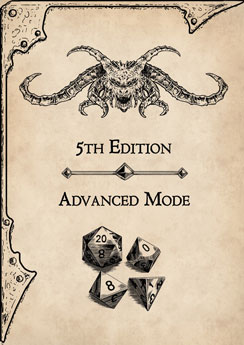Large beast (animal), unaligned
Armor Class 12 (Natural Armor)
Armor Class (suggested) 13 (Natural Armor)
Hit Points 19 (3d10+3)
Speed 20 ft., swim 30 ft. (suggested swim 40 ft.)
Proficiency Bonus +2
Proficiency Bonus +2 (5th Edition Advanced Mode)
| STR | DEX | CON | INT | WIS | CHA |
|---|---|---|---|---|---|
| 15 (+2) | 10 (+0) | 13 (+1) | 2 (-4) | 10 (+0) | 5 (-3) |
Skills Stealth +2
Skills (suggested) Perception +2, Stealth +4
Senses passive Perception 10
Challenge 1/2 (100 XP)
Death Roll (suggested). The crocodile can make a death roll attack on a target that has not escaped the grapple of its bite. The death roll inflicts 11 (2d8+2) slashing damage (no hit roll required), but the crocodile cannot take any other action.
Hold Breath. The crocodile can hold its breath for 15 minutes.
Surprise Attack (suggested). When the crocodile is underwater and undetected (the target fails a perception check against the crocodile’s stealth check), then the crocodile gains advantage on its attack with the jaw.
Water Sensitive (suggested). The crocodile has advantage on all perception checks when underwater and to detect targets moving in water.
ACTIONS
- Multiattack (suggested). The crocodile makes two attacks, one with its bite and one with its tail.
- Bite. Melee Weapon Attack: +4 to hit, reach 5 ft., one creature. Hit: 7 (1d10 + 2) piercing damage. The target is grappled (escape dc 12) Until this grapple ends, the target is restrained, and the crocodile can’t bite another target.
- Bite (suggested). Melee Weapon Attack: +4 to hit, reach 5 ft., one creature. Hit: 7 (2d4 + 2) piercing damage. The target is grappled (escape DC 12) Until this grapple ends, the target is restrained, and the crocodile can’t bite another target. If the target was victim of a Surprise Attack the saving throw to escape the grapple suffers disadvantage.
- Tail (suggested). Melee Weapon Attack: +4 to hit, reach 10 ft., one creature. Hit: 8 (1d12 + 2) piercing damage. The target must succeed a DC 12 Strength saving throw or be knocked prone.
5th Edition Advanced Mode
Limiting the power of a character and making the overall difficulty of the game harder, does not reduce the creativity, indeed it does quite the opposite.
The Game Master has the option to use any and all of the instances proposed in this guide, or just some of them according to their preference.
It is the lack of something that move and motivate characters, not the abundance of it
DESCRIPTION
Crocodiles are large, reptilian predators that lurk in the swamps and rivers of the world. They have powerful jaws, armored scales, and long, muscular tails. They can grow up to 12 feet long and weigh up to 500 pounds. Crocodiles are usually green or brown in color, with darker spots or stripes on their backs and tails. They have keen senses of smell and hearing, but poor eyesight. They can hold their breath for up to 15 minutes, allowing them to ambush their prey from underwater.
COMBAT
Crocodiles are large, reptilian predators that lurk in the swamps and rivers of the world. They have powerful jaws, armored scales, and long, muscular tails. They can grow up to 12 feet long and weigh up to 500 pounds. Crocodiles are usually green or brown in color, with darker spots or stripes on their backs and tails. They have keen senses of smell and hearing, but poor eyesight. They can hold their breath for up to 15 minutes, allowing them to ambush their prey from underwater.
HABITAT / SOCIETY
Crocodiles are solitary creatures, only coming together to mate or fight over territory. They are territorial and aggressive, defending their hunting grounds from other crocodiles and intruders. Crocodiles are not very intelligent, but they have a primal cunning that allows them to adapt to their environment and prey. Crocodiles have no natural enemies, except for larger crocodiles or other apex predators. They are feared and respected by many cultures, and some even worship them as gods or ancestors.
ECOLOGY
Crocodiles are carnivorous, feeding on fish, amphibians, reptiles, birds, mammals, and even other crocodiles. They can go for weeks without eating, digesting their food slowly in their stomachs. Crocodiles are cold-blooded, meaning they rely on external sources of heat to regulate their body temperature. They often bask in the sun on the banks of rivers or swamps, or submerge themselves in the water to cool off. Crocodiles reproduce by laying eggs in nests made of mud and vegetation. The female crocodile guards the nest until the eggs hatch, and then leads the young to the water. Crocodiles can live for up to 60 years in the wild.
